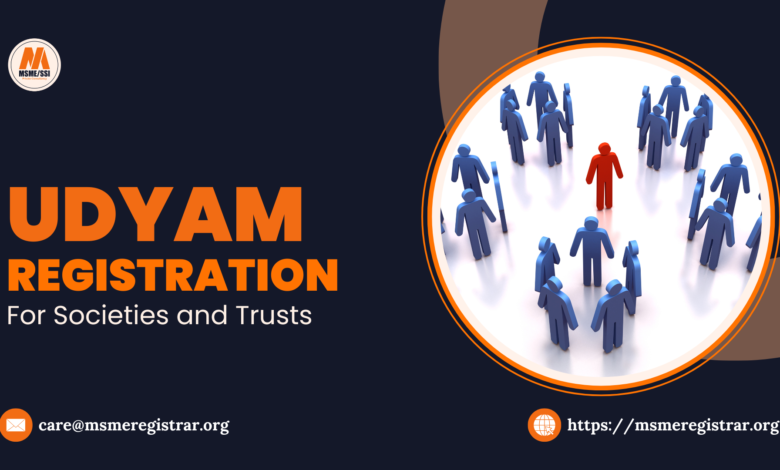Udyam Registration for Societies and Trusts: Unlocking Opportunities for Growth

Udyam Registration for Societies and Trusts: Unlocking Opportunities for Growth
In recent years, Udyam Registration has emerged as a crucial step for businesses and enterprises looking to formalize their operations and gain access to a range of government benefits. Initially designed for Micro, Small, and Medium Enterprises (MSMEs), Udyam Registration has now expanded its scope to include societies and trusts. This inclusive approach is part of the government’s efforts to promote social welfare, encourage entrepreneurship, and support the growth of diverse organizational structures in India.
Understanding Societies and Trusts
Before exploring Udyam Registration for societies and trusts, it is essential to understand what these entities are and how they operate.
Societies:
Societies are formed by a group of individuals coming together with a common objective, typically focusing on charitable or social welfare activities. Societies are governed by the Societies Registration Act, 1860, and are often involved in activities like education, art, culture, sports, and more. They operate on a non-profit basis and aim to serve the community’s broader interest.
Trusts:
Trusts are established when an individual or a group of individuals transfers property or assets to a trustee for the benefit of a specific purpose or group. Trusts in India are governed by the Indian Trusts Act, 1882, and the Charitable and Religious Trusts Act, 1920. Like societies, trusts typically serve charitable purposes, including education, healthcare, social welfare, and environmental protection.
Benefits of Udyam Registration for Societies and Trusts
Udyam Registration offers numerous benefits to societies and trusts, especially those involved in economic or enterprise-related activities. Some of the key advantages include:
Access to Credit:
Registered MSMEs, including societies and trusts, can access collateral-free loans under various government schemes such as the Credit Guarantee Fund Scheme for Micro and Small Enterprises (CGTMSE). This can be especially beneficial for non-profit entities that often struggle to secure funding from traditional sources.
Subsidies and Incentives:
Societies and trusts that register under Udyam can avail themselves of various subsidies, including those related to technology upgradation, infrastructure development, and quality certification. These incentives can help reduce operational costs and improve the quality of services provided.
Government Tenders:
Registered MSMEs are given preference in government procurement processes. Societies and trusts engaged in providing educational services, healthcare, or other public welfare activities may find this particularly useful when bidding for government tenders.
Market Support:
Udyam Registration opens doors to marketing assistance through government initiatives like the MSME Market Development Assistance Program. This helps registered entities promote their products and services, both domestically and internationally.
Priority Sector Lending:
Societies and trusts classified as MSMEs are eligible for priority sector lending from banks and financial institutions. This ensures that they can access credit at favorable interest rates and terms, enabling them to expand their operations and impact.
Tax Benefits:
MSMEs registered under Udyam are eligible for various tax exemptions and reductions, depending on their activities and sector. This can lead to significant savings and enable societies and trusts to redirect more resources towards their social objectives.
Note: Apply for Udyam Re-registration through the official portal.
Conclusion
Udyam Registration represents a valuable opportunity for societies and trusts in India to professionalize their operations, access government benefits, and scale their impact. By registering as MSMEs, these organizations can leverage resources such as credit, subsidies, and market support to further their social and charitable objectives. However, it is essential for societies and trusts to carefully evaluate their eligibility and be prepared to meet the compliance requirements that come with Udyam Registration. In doing so, they can unlock new avenues for growth and contribute more effectively to the nation’s socio-economic development.




